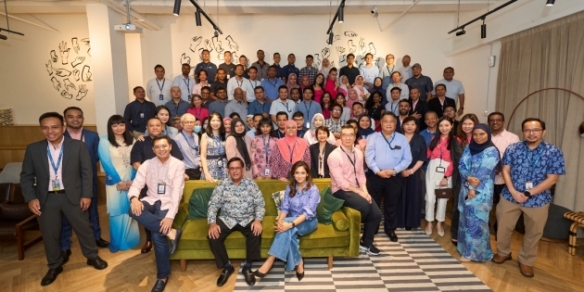Malaysia's homegrown players not on fast growth track
By Karamjit Singh July 22, 2013
- Malaysian companies in MDeC’s three clusters show steady, lumpy revenues
- Badlisham sees ‘trust’ as a chasm that private sector buyers must cross
 WHEN one talks about the heartbeat of the tech ecosystem in Malaysia, invariably the Multimedia Development Corporation (MDeC) and its cluster of MSC Malaysia companies come to the fore, and specifically, the homegrown, entrepreneur-led companies.
WHEN one talks about the heartbeat of the tech ecosystem in Malaysia, invariably the Multimedia Development Corporation (MDeC) and its cluster of MSC Malaysia companies come to the fore, and specifically, the homegrown, entrepreneur-led companies.
For it is their growth and success that is the barometer by which the impact of the Multimedia Super Corridor (MSC) vision, the transformational plan to make information technology an economic pillar of the country, will be judged.
MDeC had on May 22, announced the 2012 financial performance of MSC companies, which recorded RM33.53 billion in revenue, up 5.7% from 2011. It emphasised the focus on quality over quantity in responding to concerns over the 59% drop in investments in the Shared Services and Outsourcing (SSO) sector.
Interestingly, by comparison, MDeC announced the 2011 financial performance as ‘the best year yet’ for the MSC, with MSC Malaysia companies revenue coming in at RM31.7 billion, up 16% from 2010, while exports grew to RM10.12 billion, a 9% rise from the previous year.
[RM1 = US$0.31]
In comparison, 2012 would then be another ‘best year yet’ but MDeC choose not to emphasise this point.
With the performance of homegrown companies being the key gauge of the MSC’s impact, Digital News Asia (DNA) requested for the breakdown of revenue between homegrown and foreign companies in the three key clusters MDeC has split its MSC Malaysia companies into – InfoTech, Creative Multimedia and Content (CMC) and SSO.
In an interview with MDeC chief executive officer (CEO) Badlisham Ghazali regarding the breakdown of revenue and the agency's clusters of MSC Malaysia companies, he described the steady flow of around 200 plus companies that apply to come into the MSC ecosystem every year as ‘healthy.’
“The fact that between 80% to 90% of them are local companies shows that entrepreneurs feel there are opportunities in technology," he says. "But the health of their businesses is another matter, with the small struggling to get traction while the big get bigger.”
Badlisham goes on to emphasise an oft-repeated point he likes to make -- that information technology is the most open sector where homegrown companies have to compete openly with competitors globally. “You have to constantly differentiate yourself,” he says.
Taken in this context, homegrown companies have not done too badly in 2012, though it is evident that neither cluster of homegrown companies are on a fast track of growth, with the CMC cluster probably coming the closest to claiming a fast growth trajectory.
The three charts (see images below) MDeC shared with DNA, paint the following high level picture:
Shared Services Outsourcing (SSO):
- Local SSO companies only grew headcount by a negligible 0.2% in 2012 over 2011 but total revenues rose by RM190 million or RM12% from RM1.57 billion in 2011 to RM1.76 billion in 2012;
- However the revenue of the entire sector, including foreign companies, went up by RM1.31 billion which means foreign companies captured about 84% of the incremental revenue; and
- Another damper on the performance of the local SSO sector was that export revenue actually declined 1% to RM394 million in 2012 versus RM399 million in 2011. This is despite various efforts to help local companies win overseas business including regular participation in trade missions.
The latest news on this front is that Outsourcing Malaysia, an initiative under the national ICT association Pikom, will be organising the international Asia Pacific Outsourcing Summit (APOS) with the International Association of Outsourcing Professionals (IAOP) in Iskandar Malaysia in Oct.
There is an element of marketing to this, as presumably the international participants to this summit will be exposed to Malaysian SSO players and their capabilities.
Creative Multimedia and Content (CMC):
- Local CMC companies had a good year, in terms of job growth, with a 17% increase or 1,471 new jobs and with revenues rising by 14% from RM5.49 billion to RM6.27 billion; and
- The standout figure that catches the attention is the almost 27% jump in export revenues from RM258 million in 2011 to RM327 million in 2012.
Unlike their SSO counterparts, this export growth shows that efforts to internationalise the attractiveness of Malaysian made content are bearing fruit.
-
The homegrown component of the InfoTech cluster, which showed the strongest growth in 2011, was not able to maintain its performance. It saw a big slump in 2012 with local revenue falling 23% from RM5.61 billion to RM4.34 billion while exports went up a negligible 1%;
- Total revenue dropped 20% or by RM1.26 billion from RM6.42 billion in 2011 to RM5.16 billion in 2012; and
- The overall revenue of the sector also dropped by 5% in 2012 from RM15.36 billion in 2011 to RM14.66 billion.
Next page: Burning Platform issue to trigger change





